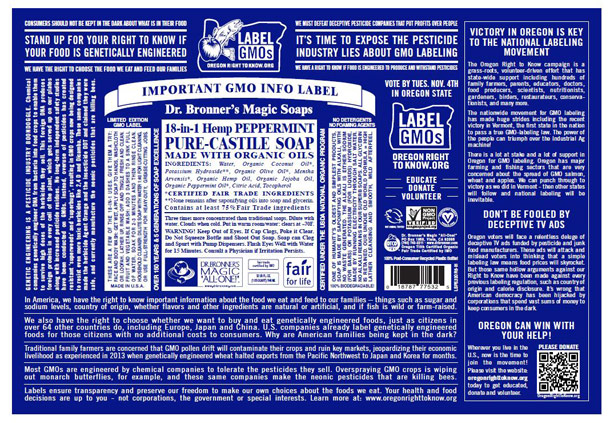David Bronner: We are going to win GMO labeling battle
By Ken Roseboro
Published: October 6, 2014
Category: GM Food Labeling and Regulations

Dr. Bronner’s Magic Soaps will feature special labels in Oregon and Colorado supporting GMO labeling initiatives in those states.
To access all the articles in this month's issue of The Organic & Non-GMO Report, SUBSCRIBE NOW.
Dr. Bronner’s Magic Soaps donates $1 million to Oregon labeling initiative, $25,000 to Colorado’s.
As GMO labeling initiatives in Oregon and Colorado move toward votes in November, Dr. Bronner’s Magic Soaps has made major commitments to both initiatives with a $1 million donation to support Measure 92 in Oregon and $25,000 to Colorado’s Proposition 105.
Company president David Bronner is confident that GMO labeling supporters can win in both states even as large food companies start to spend heavily—as they did to defeat similar initiatives in California in 2012 and Washington in 2013.
Messaging: right to know, pesticide use
Bronner said labeling campaign messages have focused on the right to know whether foods contain GMOs and the escalation of pesticide use with GM crops.
“Genetic engineering of food crops is a pesticide industry boondoggle. Rather than help farmers move to more sustainable, less chemical intensive agriculture, genetic engineering has resulted in huge increases in pesticide use contaminating our food and water and killing bees, birds and other non-target wildlife,” he said. “Overuse of pesticide is creating resistant superweeds and superbugs, which leads to more volume of more toxic pesticides sprayed. Now chemical companies are engineering resistance in food crops to much more toxic weed killers like Dicamba and 2,4-D. Americans need to wake up to the secret changes chemical companies are making to our food and demand transparency in food labeling.”
By early October, opponents of Oregon’s Measure 92, including Monsanto, PepsiCo, General Mills, Hershey, J.M. Smucker, and others donated nearly $6 million to defeat the initiative.
Meanwhile, Measure 92 supporters had raised about $3 million.
Bronner said a big focus of the labeling effort in Oregon—unlike similar initiatives in California and Washington—has been registering new voters; Oregon’s labeling campaign has registered 100,000 new voters.
“If you do voter registration and get out the vote, you can win,” he said.
Bronner emphasized the importance of Oregon and Colorado labeling initiatives as well as Vermont’s passage of a GMO labeling law earlier this year.
“The path to mandatory labeling is through the states,” he said.
In Oregon and nationally, natural product stores will stock a limited edition Dr. Bronner’s castile liquid soap with the GMO-info label, boasting support for Yes on 92, and another special label will be distributed throughout Colorado and Rocky Mountain states in support of Initiative 105, from September through November of 2014.
Urban voters key to labeling victory
Oregon’s voters soundly rejected the first GMO labeling ballot initiative in 2002, Measure 27, but the political climate has changed since then. According to a report by Governing, anti-GMO furor has swept across Oregon even in rural areas. Jackson and Josephine counties in southern, rural Oregon passed bans on plantings of GM crops this past May. Similar bans have been proposed in Benton and Lane counties.
In fact, GMO labeling opponents face an uphill battle because other communities in Western Oregon, where most of the state’s population lives, appear to support labeling.
Oregon’s political scientists say that urban voters are the key to whether labeling will pass; these voters must go to the polls and vote yes. Such support was lacking last year in Washington State.
Bronner is confident that Oregonians will vote yes for Measure 92.
“The biotech companies’ technology is failing and we are going to win,” he said.
(Sources: Governing, Statesman Journal)
© Copyright The Organic & Non-GMO Report, October 2014




